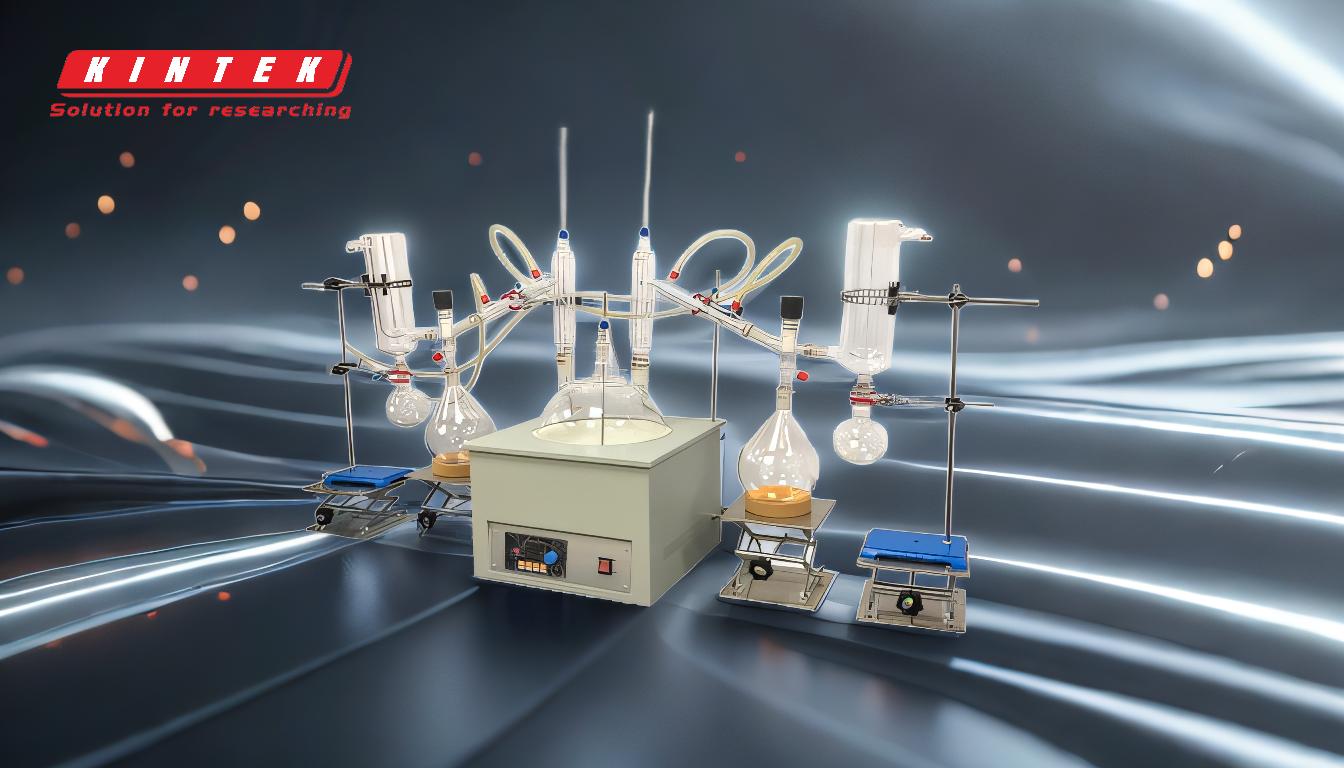Short-path distillation is a specialized technique used in various industries for the separation and purification of high boiling point, heat-sensitive, and thermally unstable materials. Its applications span across pharmaceuticals, food processing, cosmetics, petrochemicals, and more. This method is particularly valuable for handling substances that decompose, oxidize, or polymerize at high temperatures, ensuring minimal product loss and high purity. Key applications include the extraction of CBD oil, processing of edible oils, creation of fragrances, and purification of high-value compounds like vitamins, fatty acids, and polymers. The process is gentle, efficient, and ideal for industries requiring precise separation and minimal thermal degradation.
Key Points Explained:

-
Separation of High Boiling Point and Heat-Sensitive Materials:
- Short-path distillation is designed to handle materials with high boiling points that are sensitive to heat. This includes natural and synthetic vitamins, plant extracts, and oils.
- The process operates under reduced pressure, lowering the boiling points of substances and reducing the risk of thermal degradation, oxidation, or polymerization.
- Example: In the pharmaceutical industry, it is used to purify heat-sensitive compounds like vitamins and essential oils without compromising their integrity.
-
Removal of Solvent Residues:
- This technique is effective in removing residual solvents from chemical raw materials and finished products in industries such as food, medicine, cosmetics, and building materials.
- The gentle evaporation process ensures that solvent residues are efficiently removed without damaging the product.
- Example: In the production of cosmetics, short-path distillation ensures that solvent traces are eliminated from essential oils and fragrances, enhancing product safety and quality.
-
Decolorization and Deodorization:
- Short-path distillation is widely used for decolorizing and deodorizing natural intermediates, fatty acids, and their derivatives.
- The process removes impurities and unwanted odors, resulting in high-purity products suitable for sensitive applications.
- Example: In the food industry, it is used to purify edible oils by removing colorants and odors, improving their shelf life and consumer appeal.
-
Preparation of High-Boiling Process Materials:
- This method is ideal for preparing high-boiling materials and determining their boiling ranges, especially for heat-sensitive substances.
- It is commonly used in the petrochemical and polymer industries for processing materials like polyols, epoxy resins, and heavy oils.
- Example: In the production of polyurethane, short-path distillation ensures the separation and purification of raw materials, enhancing the quality of the final product.
-
Applications in Specific Industries:
- Pharmaceuticals: Used for extracting and purifying CBD oil, vitamins, and other medicinal compounds.
- Food Processing: Applied in the purification of edible oils, flavors, and monoglycerides.
- Fragrance and Cosmetics: Essential for creating high-quality fragrances and cosmetic ingredients.
- Petrochemicals: Utilized for distilling heavy oils, paraffin oils, and other high-boiling compounds.
- Polymers and Plastics: Effective in processing polyurethane, epoxy resins, and other polymer materials.
-
Advantages Over Traditional Distillation:
- Short-path distillation minimizes product loss by using less glassware and reducing material adhesion to apparatus surfaces.
- It operates under vacuum conditions, ensuring lower temperatures and shorter exposure times, which are critical for heat-sensitive materials.
- The process is scalable and adaptable, making it suitable for both laboratory and industrial applications.
-
Handling Thermally Unstable Compounds:
- This method is particularly effective for compounds that decompose, oxidize, or polymerize at atmospheric pressure.
- By operating under reduced pressure, short-path distillation prevents thermal degradation, ensuring the integrity of the final product.
- Example: In the production of fragrances, it is used to distill delicate aromatic compounds that would otherwise degrade under traditional distillation conditions.
In summary, short-path distillation is a versatile and efficient technique with broad industrial applications. Its ability to handle high boiling point, heat-sensitive, and thermally unstable materials makes it indispensable in industries requiring precise separation and purification processes. From pharmaceuticals to food processing, this method ensures high-quality, pure products while minimizing waste and thermal damage.
Summary Table:
| Key Features | Applications |
|---|---|
| Separation of heat-sensitive materials | Purification of vitamins, essential oils, and plant extracts in pharmaceuticals |
| Removal of solvent residues | Elimination of solvents in cosmetics, food, and building materials |
| Decolorization and deodorization | Purification of edible oils, fatty acids, and derivatives |
| Preparation of high-boiling materials | Processing polyols, epoxy resins, and heavy oils in petrochemicals |
| Scalable and efficient | Suitable for both laboratory and industrial applications |
Learn how short-path distillation can optimize your processes—contact our experts today!









